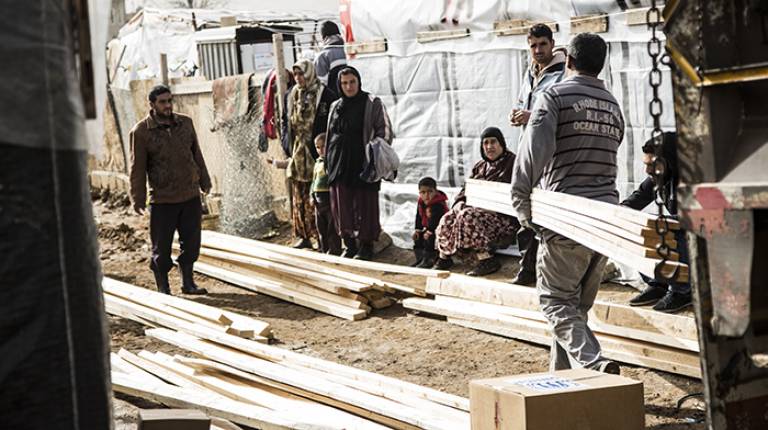The DPU and Save the Children UK have embarked on a research programme that aims to inform humanitarian action and policy makers in urban contexts of protracted displacement

The Bartlett’s Development Planning Unit (DPU), University College London and the Humanitarian Affairs Team at Save the Children UK have embarked on a research programme at the intersection of urban, humanitarian and forced migration studies. The project aims to inform humanitarian action and policy makers in urban contexts of protracted displacement.
As protraction of crises increasingly becomes a long term drive for urban change and a challenge for city governance and infrastructures, this research project focuses on “urban-itarian” settings: that is the interactional moment between the urban and the humanitarian, when cities have become home to humanitarian actors and de facto refugees, and urban and humanitarian infrastructures provide and negotiate basic services and livelihoods.
The project investigates how human, social, and economic relations, exchange and consumption experiences can better inform humanitarian policies and practices, both of which regulate access and relations to services, labour, and resources.
Taking the perspective that markets of commodities, labour, and housing can be studied as social practices, it uses the notion of the “market” as the sociological field of investigation. As such, the research looks at the site where daily practices of informal and institutional actors are enmeshed, changing the urban environment they inhabit and share. The project looks specifically at cities where large numbers of de facto refugees have relocated over time, and where there is a presence of humanitarian agencies addressing ‘refugee crises’.
Through an analysis of the socio-economic behaviours of refugees, local residents, and humanitarian actors, this research seeks to improve understandings of how local struggles and opportunities for livelihoods, and daily habits, collide. More specifically, in the material and symbolical space of the “urbanitarian” moment, it analyses informal processes of self-recovery or self-support. Our programme intends to combine different empirical research examples, which shed light on the relevance of “theories of practice” for improving assistance provision policy and understanding urban transformations.
“Temporal reasoning” and intentionality are used as case selection criteria to understand how receiving cities are initially approached, often as mere transit areas, then becoming places of permanent resettlement. The collective and individual intentions of de facto refugees - shifting from going back to the country of origin, moving onwards to a third country, to staying - challenge the temporal character of policy-making and humanitarian assistance regimes, which have often been conceived with the specific intention of rendering human flows provisional.
The research is informed by a steering committee and an external advisory board, which include both academics and practitioners. Outputs will include analytical commentaries on online platforms, working papers based on field research, a comparative policy brief and an edited series of essays. The published material will also be translated into the local languages of the researched areas as far as possible.
Our primary research objectives are:
- To develop a more robust understanding of the contribution of humanitarian actors to urban transformations and their relationship with unconventional self-recovery mechanisms.
- To increase urban governance actors understanding of how the mechanisms they put in place intersect with humanitarian practices and policies.
- To identify and contextualise social and economic opportunities and challenges for refugees inhabiting the “urbanitarian” systems.
- To suggest more appropriate strategies and policies for urban and humanitarian actors, in order to cope with rapid urban changes and assist local and refugee populations.
- Research team and partners
This project has been developed by The Bartlett’s Development Planning Unit, University College London (DPU) and the Humanitarian Affairs Team of Save the Children UK (HAT).
The team of the project is composed by Estella Carpi, jointly based at DPU and HAT.
DPU
Andrea Rigon, Camillo Boano, and Cassidy Johnson.
HAT
Fernando Espada, Sophie Dicker, Jessica Field,
The Humanitarian Affairs Team seeks to inform the development and implementation of Save the Children strategy, offer proposals to improve policy and practice within the organisation and across the humanitarian sector, and foster opportunities to translate these proposals into practicable plans of action. Housed in Save the Children UK’s Humanitarian Department, the HAT provides insight into the conceptual and theoretical questions that underpin humanitarian practice.
- Events
26th-27th June
Participation in the Workshop "Livelihoods, Self-Reliance, and the 'Refugee Entrepreneur'. Rethinking Refugee Self-Reliance", held by the Refugee Studies Centre, University of Oxford.
Friday June 23rd (12-1pm)
Presentation of our research programme at the headquarter of Save the Children UK in the 'Rendezvous' space, 1st floor, 1 St. John's Lane, EC1M 4AR, London. This event is open to the public. If you'd like to participate please contact E.Carpi@savethechildren.org.uk.
Thursday June 22nd (9.30am-5.30pm)
Presentation of our partnership and our research programme at the UCL Humanitarian Institute launch. If you miss our oral presentation, visual material illustrating the cornerstones of our framework and field studies will be available all day. The event will be open to the public.
Tuesday June 20th (12-6pm)
Workshop on "Refugee Self-Reliance in Cities: Challenges and Opportunities", with Jindal Global University’s School of International Affairs, hosted by the University of Manchester’s Migration Lab.
Friday December 9, 2016
First workshop with experts
The research team has presented the theoretical framework of the project and discussed refugee self-reliance and humanitarian practices by considering:
- The physical environment to which the refugees relocated
- The host government policies in regards to refugees’ rights and right to work
- The local history of urban livelihoods and access to services
- Formal and informal character of provision and space
 Close
Close

